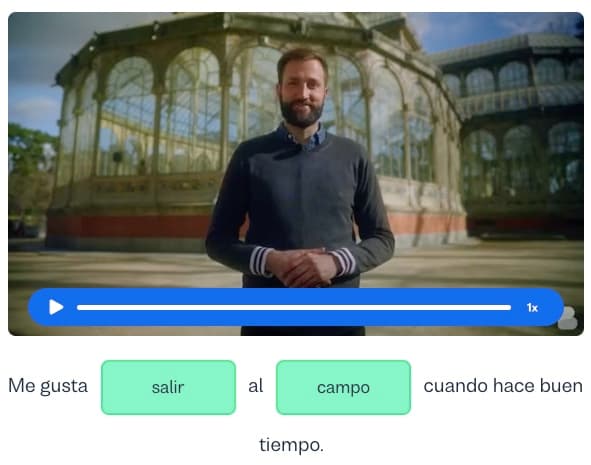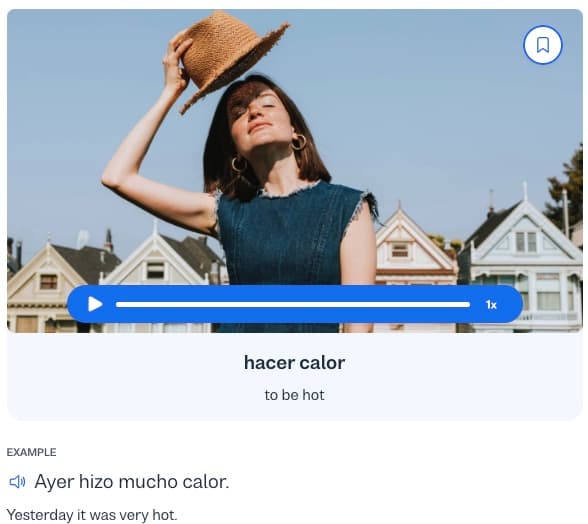I want to learn...
When you have a video call with a client or a group chat with your family, what is one of the first things you talk about? The weather is always a popular topic to start and break in lightly in the conversation!
Around the world, talking about the weather is a tried-and-true icebreaker. In this article, we will discuss various weather phrases and words in Spanish that are commonly used in conversations, as well as expressions describing the weather.
Let’s start learning Spanish words and phrases!
Spanish weather words
If you are talking about the seasons in Spanish orlas estaciones, or just want to describe the weather orel tiempo today, there are many Spanish weather words for you to choose from to describe how your day is going or how the weather is.
In terms of pronouncing these weather words in Spanish, check out our guide on Spanish pronunciation. Saying these words aloud at home will help them roll off your tongue and help you remember them.
Spanish weather words
| English | Spanish | English | Spanish |
|---|---|---|---|
| Blizzard | Una ventisca | Seasons | Las estaciones |
| Breeze | La brisa | Seasons | Las temporadas |
| Clouds | Las nubes | Sleet | El aguanieve |
| Cloudy | Nublado/a | To sleeting | Caer aguanieve |
| Downpour | El aguacero | Snow | La nieve |
| Drizzle | La llovizna | To snow | Nevar |
| Drought | La sequía | Snowy | Nevado/a |
| Fall | El otoño | Spring | La primavera |
| Fault lines | Las fallas | Storm | La tormenta |
| Flood | La inundación | Stormy | Tormentoso |
| Fog | La niebla | Summer | El verano |
| Foggy | Neblinoso | Sun | El sol |
| Frost | La helada | Sunny | Soleado/a |
| To hail | Granizar | Sunshine | Los rayos del sol |
| Hailing | Granizando | Temperature | La temperatura |
| Hailstorm | La granizada | Thunder | El trueno |
| Humid | Húmedo/a | To thunder | Tronar |
| Hurricane | El huracán | Thunderstorm | La tormenta eléctrica |
| Lightning bolt | El rayo | Tornado | El tornado |
| Lightning (flash of) | El relámpago | Tremor | El temblor |
| Mist | Neblina | Tropical cyclone | El ciclón tropical |
| Misty | Brumoso/a | Tropical storm | La tormenta tropical |
| Monsoon | Un monzón | Tsunami | El tsunami |
| Overcast | Cubierto | Typhoon | El tifón |
| Quake | El sismo | Weather | El clima |
| Rainbow | El arcoíris | Weather | El tiempo |
| Rain | La lluvia | Weather forecast | El pronóstico del tiempo |
| To rain | Llover | Wind | El viento |
| Rainy | Lluvioso/a | Windy | Ventoso/a |
Now that we know some of the Spanish weather words, let’s learn how to ask questions about the weather in Spanish!
Spanish weather questions
Just like in English there are many ways to ask about the weather in Spanish.
Remember, in Spanish we add inverted question marks and accent marks to Spanish question words.
Tip: Notice that the words for weather (tiempo and clima) are interchangeable but the question structure is different:
Tiempo: ¿Qué tiempo hace? (What’s the weather like?).
Clima: ¿Cómo está el clima? (How’s the weather?)
Examples of Spanish weather questions
¿Qué tiempo hace hoy? (What’s the weather like today?)
¿Cómo está el clima hoy? (How’s the weather today?)
¿Qué tal está el clima? (How’s the weather?)
¿Sabes cómo va a estar el clima hoy? (Do you know how the weather will be like today?)
¿Sabes que tiempo va a hacer hoy? (Do you know what the weather will be like today?)
¿Cuál es el pronóstico del tiempo para hoy? (What’s today’s weather forecast?)
Tip: The word tiempo (time) in Spanish has different meanings based on context. The most common ones are time and weather.
4 ways to describe the weather in Spanish
In English, we say: it’s snowing, raining, drizzling, hailing, sunny, foggy, cloudy ( adjectives).
In Spanish, there are four verbs to describe the weather:
1. The verb estar (to be)
The below examples mean: is going to, it will, or it is. They’re all the third-person singular form of the Spanish verb estar or to be.
Examples:
Está a punto de llover. (It’s about to rain.)
Hoy está lloviendo mucho. (It’s raining a lot today.)
Parece que lloverá más tarde. (It looks like it’s going to rain later.)
Está nevando bastante fuerte. (It’s snowing pretty hard.)
Dicen que va a nevar más tarde. (They say it’s going to snow later.)
Está ventoso. (It’s windy.)
Está soleado. (It’s sunny.)
Está despejado. (It’s clear.)
Está granizando. (It’s hailing.)
Está tormentoso. (It’s stormy.)
Está lloviznando. (It’s drizzling.)
Está tronando. (It’s thundering.)
Está muy húmedo. (It’s very humid.)
Está un poco nublado. (It’s a little cloudy.)
2. The verb hacer (to do)
Use hacer to describe the weather in Spanish.
Examples:
Hoy hace calor. (Today is hot.)
Hace mucho frío. (It’s very cold.)
Hace un poco de viento. (It’s a little windy.)
¿Saliste afuera? ¡Hace mucha niebla! (Have you been outside? There’s a lot of fog.)
3. The verb haber (to have)
Use haber to describe the weather in Spanish.
Examples:
Hay sol. (It’s sunny.)
Hay niebla. (It’s foggy.)
Hay viento. (It’s windy.)
Hay relámpagos. (It’s lightning.)
Hay tormenta. (There’s a storm.)
Hubo un aguacero. (There was a downpour.)
No hay ni una nube. (There’s not a cloud in the sky.)
4. The verbs nevar / llover / relampaguear / tronar (to snow / to rain / to lightning / to thunder)
You can simply conjugate these four verbs without usingestá, hace or hay. Though it’s also common to use está with snow, rain and thunder, and hay with lightning.
Examples:
Nieva. (It’s snowing.)
Nieva en las montañas en invierno. (It snows in the mountains in winter)
Llueve. (It’s raining.)
En verano llueve a diario. (It rains daily in summer.)
Relampaguea. (It’s lightning.)
Truena. (It’s thundering.)
De vez en cuando relampaguea y truena. (Once in a while there’s lightning and thunder.)
Good to know: If you notice, all of the conjugations above use the third-person singular (it) form of the verbs to describe the weather in Spanish.
Está (is)
Está + gerund (it is + gerund)
Va a + verb in infinitive (it is going to + verb in the infinitive)
Hace (it is)
Hay (there is)
Spanish weather expressions
Like in English, there are a lot of idiomatic expressions to talk about the weather in Spanish. Here you have some ideas to talk about the rain, the cold, the heat or when the weather is ideal. But get creative! Spanish weather is a wonderful opportunity to practice.
1. Lluvia (rain)
¡Llueve a cántaros! (It’s raining cats and dogs.)
¡Llueve a mares! (It’s pouring out.)
¡Está lloviendo a cántaros! (It’s raining cats and dogs.)
¡Está lloviendo a mares! (It’s pouring out.)
Hay un chaparrón afuera. (There’s a downpour outside.)
¡Está cayendo una cortina de agua! (It’s raining cats and dogs.)
2. Frío (cold)
¡Qué frío! (It’s cold!)
Está helado. (It’s frozen.)
¡Qué frío que hace! (It’s so cold!)
Hace un frío que pela. (It’s so cold it burns.)
¡Hace un frío que te cala los huesos! (It’s bone-chilling cold!)
3. Calor (heat)
¡Qué calor! (It’s hot!)
Es un horno. (It’s an oven.)
¡Qué calor que hace! (It’s really hot!)
El día está caluroso. (It’s warm today.)
¡Hace un calor que parte la tierra! (It’s splitting hot!)
Parece que será un día muy caluroso. (Seems like it ill be a very hot day.)
4. Hermoso día (beautiful day)
Un clima ideal. (Ideal weather)
Se está a gusto fuera. (It’s nice out.)
El día está perfecto. (The day is perfect.)
Está rico el clima. (The weather is great.)
Hace buen tiempo. (The weather is nice.)
Now you have learned about the different Spanish weather phrases and words. And next time you start a conversation in Spanish with your friends and colleagues, you can use these expressions and phrases about the weather in Spanish to make your conversation more interesting!
Spanish is rich in expressions to describe all the variations of the weather. Get creative and let your personality shine through your vocabulary.
Newlanguages


